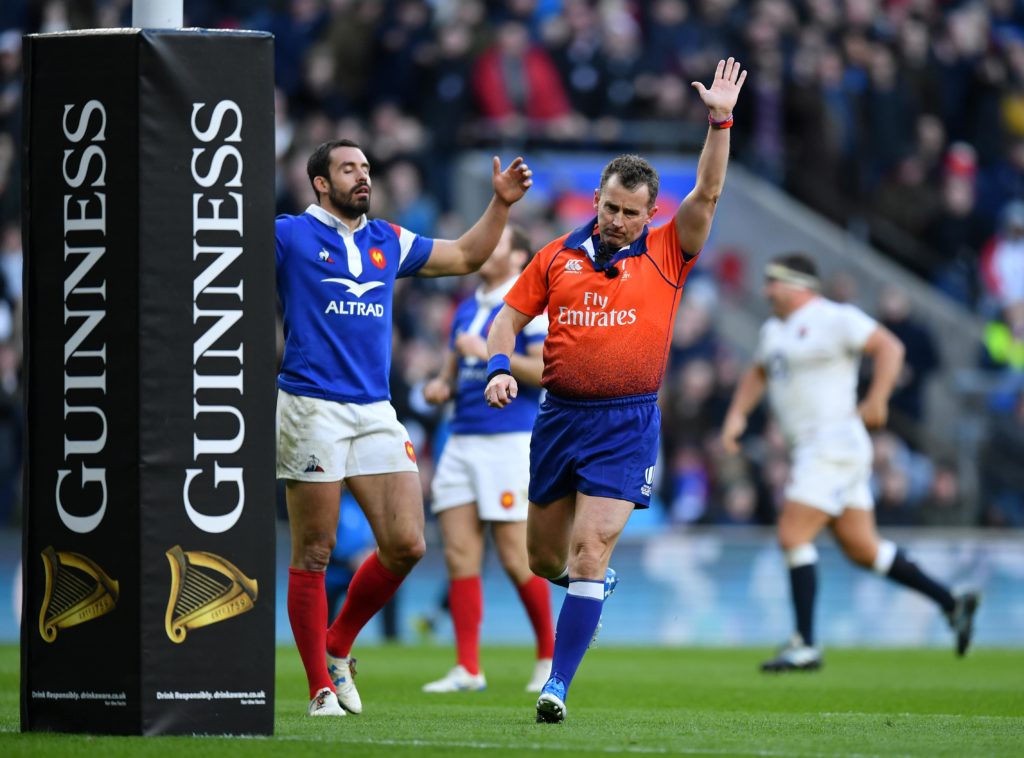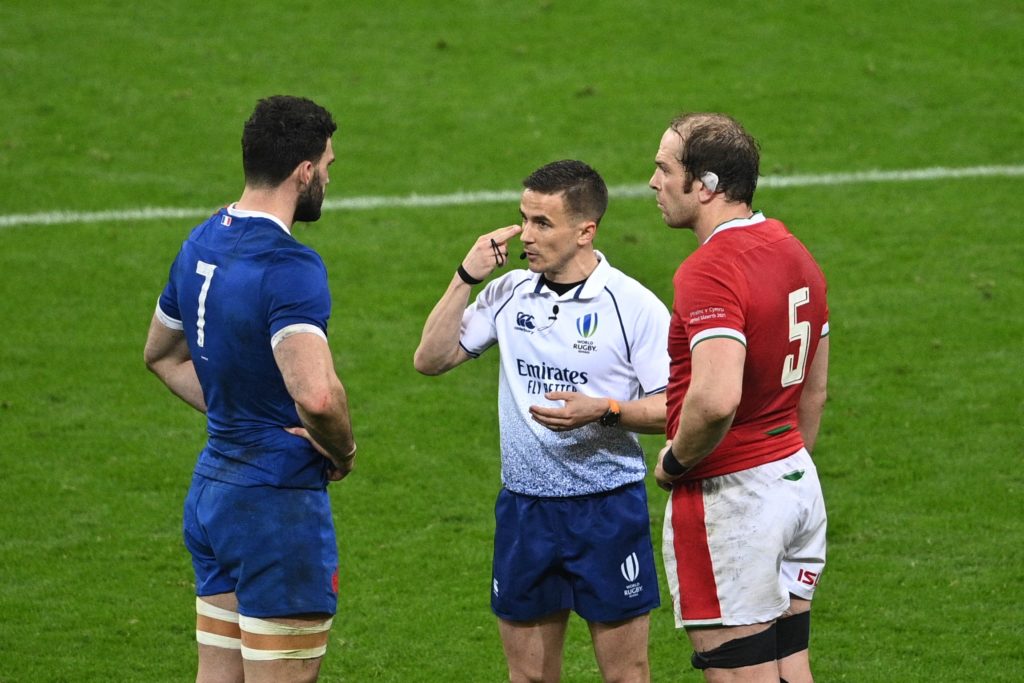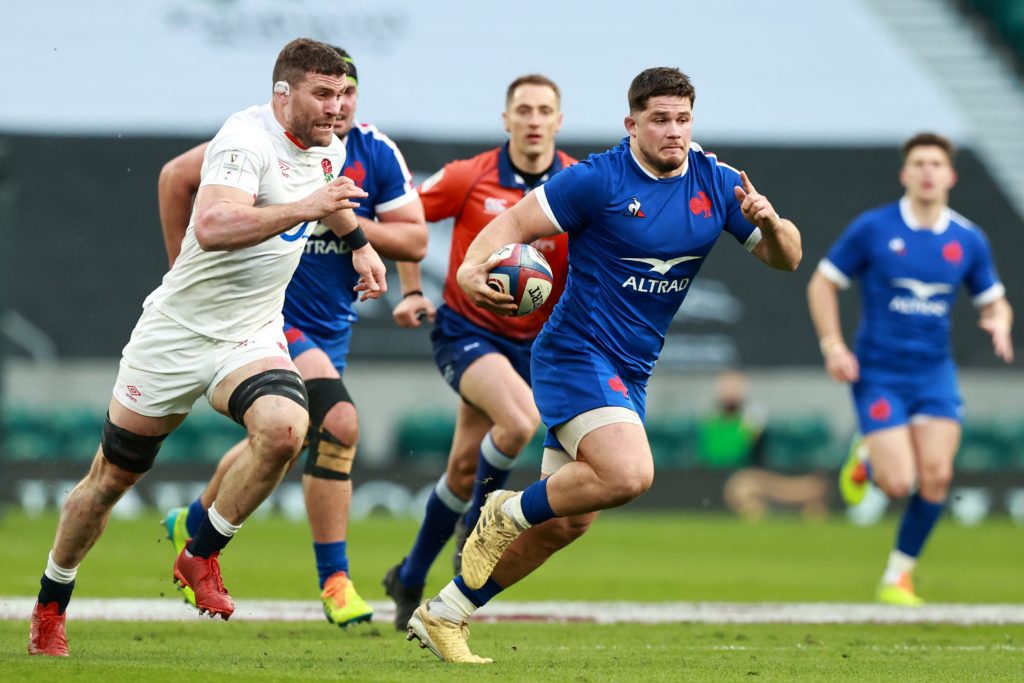During my two seasons playing amateur rugby in the deep south of France, I occasionally sledged the referee. Always in English, of course, and gentle curses muttered under my breath such as ‘prat’ and ‘plonker’, insults I reckoned that refs wouldn’t be familiar with. But in one match, when I was absurdly penalised for being off my feet at the breakdown (as if!), I blurted out a ‘bloody hell’. As we were marched back 10 yards, the referee told me in decent English that he wouldn’t tolerate swearing, whatever the language. And rightly so, I said, apologising for my indiscretion.
I learnt my lesson. Referees are to be respected, or at least, the bilingual ones are.
It is in my view remarkable that while rugby never wastes an opportunity to bill itself as a global game, the majority of their top referees speak only English – despite the fact that three of the top 10 teams in the world aren’t English speakers.
In 2015, I had what I believe in the trade is known as a Twitter ‘spat’ with Nigel Owens about this issue. Wonderful referee that he was, Owens never made any attempt to speak French, not a word. I remember one occasion he penalised France, explaining to then-captain Guilhem Guirado that it was for their “wilful” indiscipline. There are probably a few British players who don’t know what ‘wilful’ means, let alone French ones. Guirado walked away with a look of bemusement on his face.

It was my view that Owens’ refusal to learn even rudimentary French reflected poorly on him. He disagreed. I seem to recall that some of his social-media followers pointed out that if I was so concerned about referees speaking French, presumably I believed they should also converse in Italian, Spanish, Georgian and Japanese. A similar point was made by Wayne Barnes in 2017. Explaining that English rugby referees were taking French lessons in order to improve their communication, he nevertheless defended the language skills of officials. “If you take the Six Nations and the Rugby Championship, there is English, Italian, French and Spanish – and you could put in Welsh on top of that – it’s quite difficult to cover them all,” added Barnes.
They have contested two World Cup finals and, along with England, they generate more revenue than any other country. In short, France are a rugby powerhouse. So why do we treat their language with such disdain?
Welsh is not a global language (in truth, it’s not even the dominant mother tongue in Wales, with only 19 per cent of the population speaking it), so we can dispense with that outlandish suggestion. As for Italian and Spanish, Italy and Argentina have emerged as serious forces in world rugby only relatively recently, although it wouldn’t hurt if referees learnt the rudiments of these languages. France, on the other hand, played their first Five Nations match in 1910. They have contested two World Cup finals and, along with England, they generate more revenue than any other country. In short, France are a rugby powerhouse. So why do we treat their language with such disdain?
This disrespect leaves French teams at a significant disadvantage. Think of a few of the most distinguished international captains of the modern era, the likes of Sam Warburton, Michael Hooper, Richie McCaw and Alun Wyn Jones. All of them were – or still are – skilled communicators. They knew what to say, and when, just a quick word here and there, getting their point of view across in the highly pressurised environment with a concise comment. The same goes for the referees. “The best referees can communicate with a nod and a wink, or one crisp, clear line – you don’t have to go into too much detail,” said Barnes.
But if English isn’t your first language, how can you produce that “one crisp, clear line”?

One wonders what the French thought of all the South African complaints after their first-Test defeat by the Lions in July. Rassie Erasmus’s post-match whine has entered rugby folklore, but former Springbok captain John Smit wasn’t far behind, saying of Jones: “You just have to look at his influence over the referee. He was hardly more than a metre and a half from the referee. He kept feeding the ref, manipulating, highlighting things… he knows how to push the buttons, ask subtle questions.” Of course, Smit never tried to influence referees in the 83 matches he skippered South Africa.
But that is how the French must feel in every Test match, tongue-tied to the silver-tongued English speakers.
With Charles Ollivon sidelined with a serious knee injury until next year, France will have a new captain for the November internationals and according to the French press it will be either Gaël Fickou or Anthony Jelonch. If I were coach Fabien Galthié, I would select as my captain the player who speaks the best English; that’s the most important attribute for a captain of France.
In this modern era, the captain as a tactician has become almost superfluous; it is the coach who calls the shots, relaying them via the ubiquitous water carriers.
Imagine a scrum on your own five-metre line, in the final minute of the game, scores level, your mind and body pushed to the point of exhaustion, and suddenly you have to translate words of a language with which you are only vaguely familiar.
The captain’s key task is communication, with his players and with the referee. In the gripping summer series between Australia and France, there were numerous instances when Jelonch struggled to make himself understood to the referee, and vice versa. Referees have become much better in recent seasons in barking brief instructions to players during matches, whether it’s policing the breakdown or warning them when they are straying offside. A few referees, among them Barnes, issue these instructions in French and English. Most don’t, however, and so it’s the responsibility of the French players to understand these commands. Imagine what that must be like: a scrum on your own five-metre line, in the final minute of the game, scores level, your mind and body pushed to the point of exhaustion, and suddenly you have to translate in your head words of a language with which you are only vaguely familiar.
This incomprehension has been accentuated by the frequent recourse to the TMO in Test matches. In Saturday’s Test between Australia and South Africa in Brisbane, the Wallaby Lachlan Swinton high-tackled Duane Vermeulen. For several minutes referee Matthew Cardy debated with the TMO whether Swinton deserved a red or a yellow card. There was a lot of umming and ahing as they watched several angles of the tackle before Swinton was dispatched to the sin-bin. Imagine if France had been one of the teams, how would they have kept up with the conversation?

Last season I interviewed Julien Marchand, the France hooker who captained Toulouse to the European and domestic Double. He told me he had been having language lessons for a season or so. “I need to keep taking them,” he said, laughing. “My English isn’t great. During European matches I understand [Anglophone referees] but when you’re tired it’s hard to express clearly what I’m thinking.”
This sense of inarticulacy felt by French captains is betrayed by their body language. Marchand is assertive and confident when communicating with referees in the Top 14; but watch him in European matches when he’s talking English – he is more hesitant and diffident. The same was true of Guirado when he captained Les Bleus and also skippered Toulon.
The World Rugby website is available in four languages: English, French, Spanish and Japanese. It’s time this polyglotism was extended to their referees. The only official who has been fluent in English and French was Alain Rolland, the former Ireland international whose father was French. His ability to communicate quickly and crisply to both France and their opponents made life easier for everyone. There were some Home Nations’ fans who claimed Rolland’s French blood should have precluded him from refereeing Les Bleus – notably Welsh supporters after he sent off Sam Warburton in their 2011 World Cup semi-final against France. He was accused of favouring the land of his father, which was nonsense. If anyone deserves to be charged with unfair bias, it’s World Rugby. If their panel of international referees really is ‘elite’, as they like to boast, then they should be able to communicate in more than just one language.
It makes a big difference when people see you trying to make an effort to speak it rather than trying nothing at all.
Referee Luke Pearce
The 2023 World Cup is in France, the perfect occasion to appoint referees who can talk the language of their host. Two years is more than enough time to learn a language. It doesn’t have to be fluent, just conversational, as is the case with the RFU’s Luke Pearce.
Pearce has worked hard in recent seasons to acquire a decent grounding in French because, as he told a podcast this week, “it’s very important for the connection” between referees and players. “It makes a big difference when people see you trying to make an effort to speak it rather than trying nothing at all,” he said. What it comes down to, added Pearce, is respect for the country you are in and their language. World Rugby would never be so disrespectful as to appoint a French referee for the Calcutta Cup who spoke barely a word of English.
Pearce has taught himself French by listening to language apps and podcasts but it’s time World Rugby introduced an intensive educational programme of their own. It should include sending Anglophone officials to France, running the line at second and third-tier matches before graduating to refereeing games, culminating in the Top 14. That is the best way to gain confidence in a language.
Who knows, they might even pick up the odd French swear word along the way.
More stories from Gavin Mortimer
If you’ve enjoyed this article, please share it with friends or on social media. We rely solely on new subscribers to fund high-quality journalism and appreciate you sharing this so we can continue to grow, produce more quality content and support our writers.


Comments
Join free and tell us what you really think!
Sign up for free